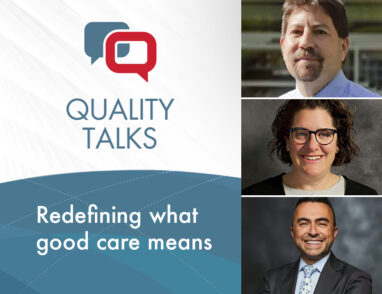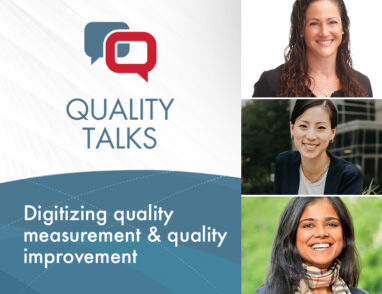Meet The Quality Talks Speaker: Nerdy Girl Lindsey Leininger
March 9, 2021 · Matt Brock
NCQA caught up with Dr. Lindsey Leininger last week for a preview of her Quality Talks presentation. She is among ten spectacular speakers we’ve lined up for this year’s premier health care quality event. Seats are going fast.
Join us April 21.
Register now.
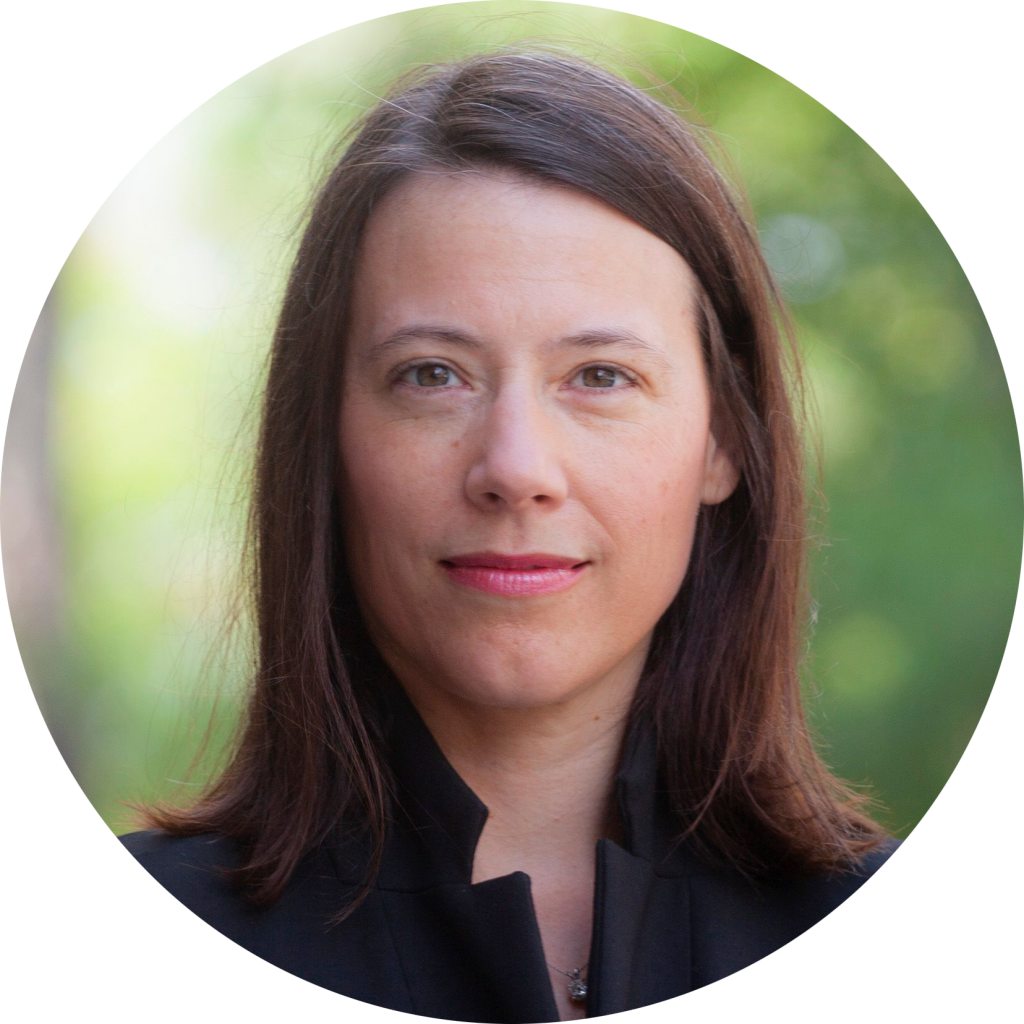
Dr. Lindsey Leininger is a public health educator who teaches and writes about data-driven health policy. Over her career, she has taught and trained policymakers, physicians, patient advocates, and executives about the intelligent use of public health and medical evidence. She is currently on faculty at the Tuck School of Business at Dartmouth College where she teaches courses at the intersection of health analytics, public health, and the health care industry. Prior to joining Dartmouth, she spent a decade designing and leading research projects for Medicaid agencies, both in academic and think-tank settings. Along with an all-female team of scientists “Nerdy Girls,” she leads a public education campaign providing timely and trustworthy information about the pandemic (@DearPandemic).
Q: Tell me about Lindsay Leininger, Dartmouth Business Professor?
Dr. Leininger: I am a public health educator here at Dartmouth’s Tuck School of Business. I’m a mom, I’m a wife, I’m a friend. I help people communicate with and about data. My whole career, that’s been the common thread.
Q: Making complex things simple, right? Communication.
Dr. Leininger: Indeed. Many moons ago, I signed up to go to PhD school so I can understand all of the complexities of public health, science, and data. I got my PhD in 2007. And ever since then, I have been undoing all of that training so I can learn how to talk like a normal person again, which I knew how to do before I started PhD school.
The way that we are trained in PhD school is very precise language about very technical and, to many people, inaccessible and boring topics. And the way that we scientists speak to each other really is a foreign language relative to how people talk in the real world and how I talk as a person. So, my entire career has been trying to bridge this distance between PhD school and the real world.
My transition has been to an academic institution where I am teaching future healthcare leaders how to communicate with and about data. And during the pandemic, I have actually been communicating with the public about public health and medical data, which is a new challenge for me. Because when we think about communication, the context is really important. How I talk about data with my MBA students is quite different than how I talk about data with the public on Facebook. It’s learning your audience deeply, putting yourself in their shoes with empathy and trying to understand what their needs are, and then crafting your message around that.
Q: Isn’t that the whole thing, engagement with patients? Connecting?
Dr. Leininger: Engagement with patients is everything. And this is how it ties back to quality in the clinical encounter. I think nurses in particular have training in those types of communication. Our first scientific publication to come out of Dear Pandemic was led by our trio of nurse PhDs. And the whole conceit of this paper is that therapeutic communication is a very powerful tool on social media, and that patient education now extends way beyond the clinic. And that healthcare providers are now dealing with the health-related cleanup of the pandemic, the epidemic, while also facing, what’s called an infodemic.
An infodemic is this information overwhelm that all of our brains are surfing right now. And it’s been an impediment to healthcare workers that the World Health Organization has actually christened the study of infodemiology as necessary to doing the work on the healthcare front and the public health work to stem the tide of the epidemic.
Q: We’re overwhelmed with new news every day.
Dr. Leininger: That’s right. Some of it good, some of it really bad. I think a lot of the focus right now appropriately is on misinformation and sort of this toxic misinformation in different pockets of media. But more than that, there’s just too much information. And this is our brains on information overwhelm. It’s very confusing. It’s a very bad soup for our brains to be swimming in.
We need curators who are trustworthy and relatable. A lot of people look to their primary care physician. A lot of people look to their nurses. They naturally have trust, and they naturally have a lot of knowledge. They have communication skills too. But what they don’t have is time. I mean, they’re paid for 17-minute encounters in the clinic. So, the healthcare quality now in my conceptualization goes beyond just treating people in a patient encounter in the clinic.
It must go towards moving patients towards being more information literate if you will. And this is where these non-traditional channels of communication come into play.
I’ll tell you some of our best quote, unquote customers at Dear Pandemic are clinicians. They’re strapped for time. They don’t have as much time as they’d like for patient education and to curate and stay on top of the information and push it out themselves. So, they are really delighted to have sources like us and our peers to pass on to their patients, so they don’t have to do it themselves.
Q: Two names you’ve dropped. Tell me about Nerdy Girls and Dear Pandemic.
Dr. Leininger: Nerdy Girls is part of our origin story at Dear Pandemic. You know, we’re a public education campaign helping people manage this information overwhelm through the pandemic. And we got our start on Facebook as a collection of female scientists who are fielding a bunch of questions from our friends and family. And it was just getting overwhelming.
Put yourself back in March (2020). Like, do I need to wipe down my groceries? Can I take a bike ride? Or am I going to get infected just by stepping outside? I mean, we were just navigating this crazy new world. We found ourselves bombarded as individuals, as friends, as family, as colleagues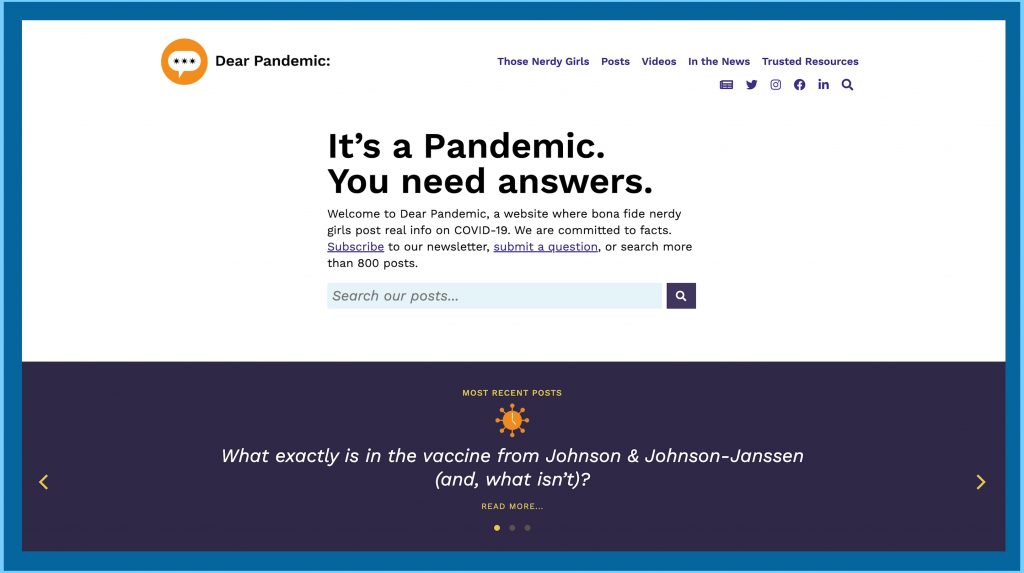 with questions. And finally, we just decided, a group of us, to band together and answer them more efficiently as a team. We did this on Facebook because a lot of us were already answering these types of questions on Facebook.
with questions. And finally, we just decided, a group of us, to band together and answer them more efficiently as a team. We did this on Facebook because a lot of us were already answering these types of questions on Facebook.
And then it just grew from there. And pretty early on, maybe a week or two into it, one of our earliest followers said there is so much confusing information out there, it’s really hard to surf, so I am just going to pay attention to what those Nerdy Girls at Dear Pandemic have to say and let that be my guide. And the name stuck, and now it’s become our brand.
Q: That’s kind of cool.
Dr. Leininger: It’s super cool. And like, we didn’t give it to ourselves. It was given. And then it was just kind of, oh yeah, that’s kind of our audience, our target, that is our relate-ability to people is that we’re just the friendly nerdy girl next door. And we happen to have 14 PhDs among us and an MD and NPs. But that’s not kind of our front door with our audience. Our front door is that we are like moms on Facebook like everybody else. And it works for our audience. Right?
Q: You have to go where they are.
Dr. Leininger: So Dear Pandemic was this ragtag collection of female scientists starting to answer our collective networks’ questions on Facebook. We happened to know each other from various professional connections. So, we just banded together because we’re like, oh my God, we’re all getting the grocery question. Let’s just answer it in one place.
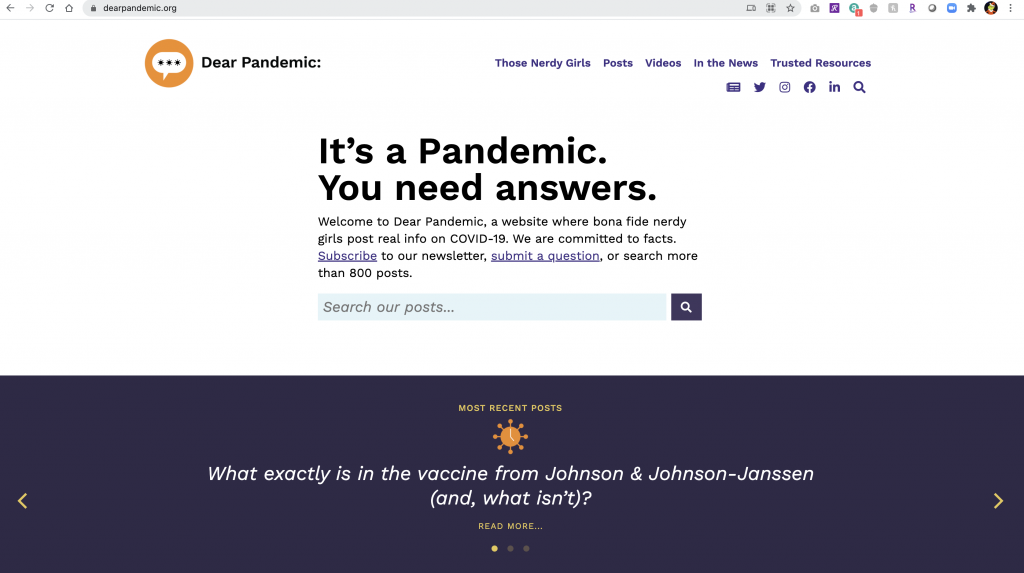 We have almost 72,000 followers on Facebook. We are also on Twitter. We have an Instagram platform. It’s about 11,000 followers. We have a website now, which is terrific, dearpandemic.org. And it’s this beautiful searchable website. So we’ve written over 800 posts about the pandemic at this point. And you can just go to our website and type in the topic. And chances are pretty good we’ve written about it. We have a Spanish language Facebook page now too.
We have almost 72,000 followers on Facebook. We are also on Twitter. We have an Instagram platform. It’s about 11,000 followers. We have a website now, which is terrific, dearpandemic.org. And it’s this beautiful searchable website. So we’ve written over 800 posts about the pandemic at this point. And you can just go to our website and type in the topic. And chances are pretty good we’ve written about it. We have a Spanish language Facebook page now too.
So, we’re Nerdy Girls on the front lines of the infodemic. We’re infodemic fighters, that’s kind of our shtick.


